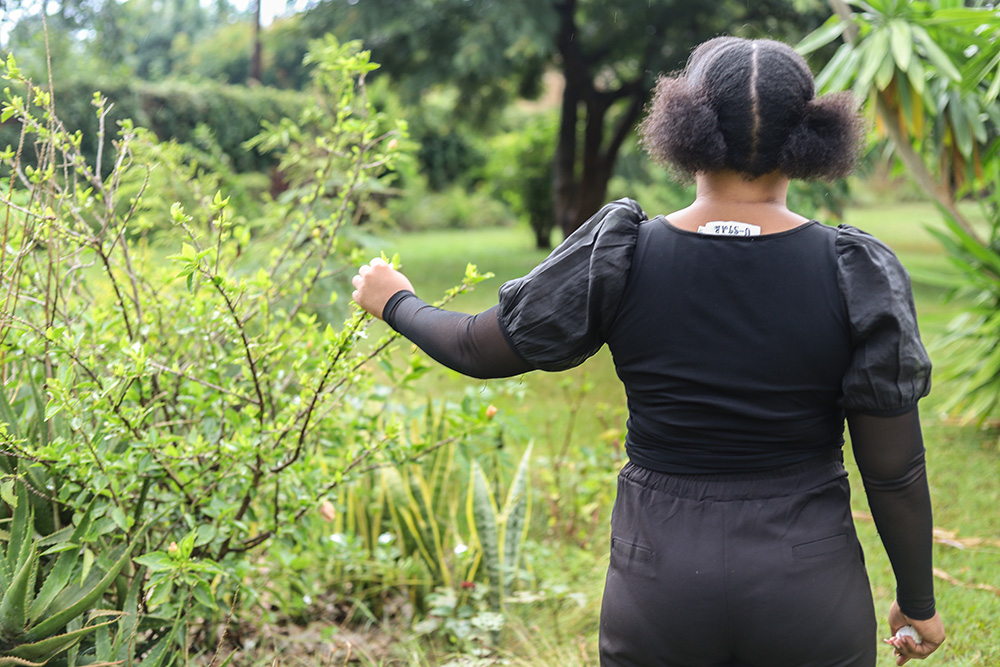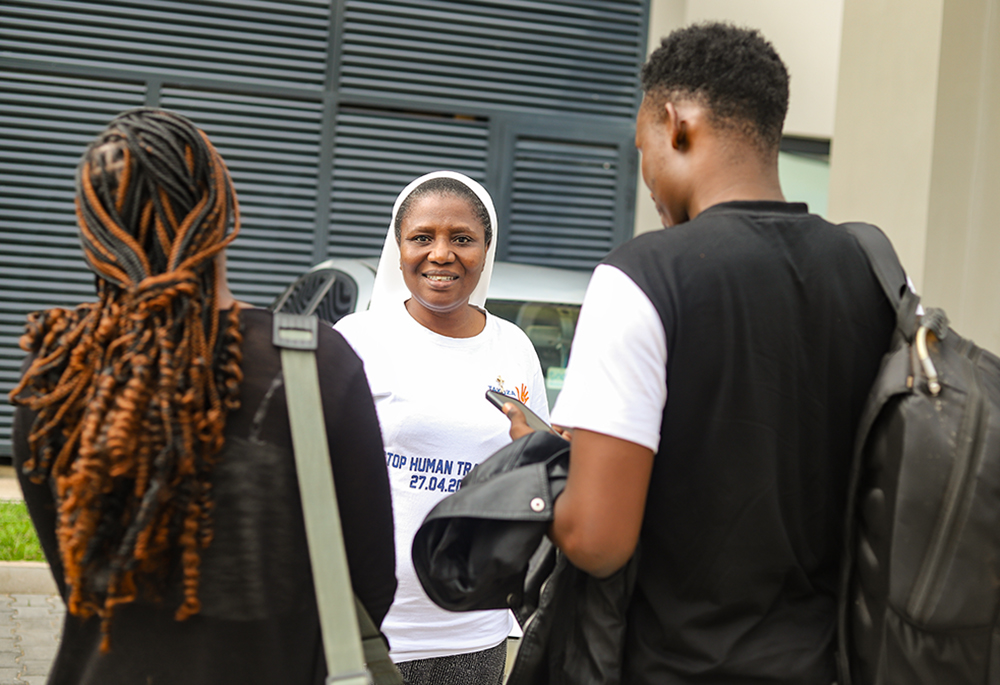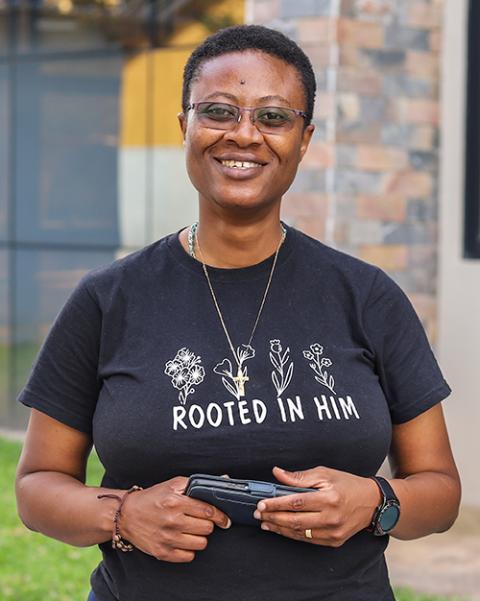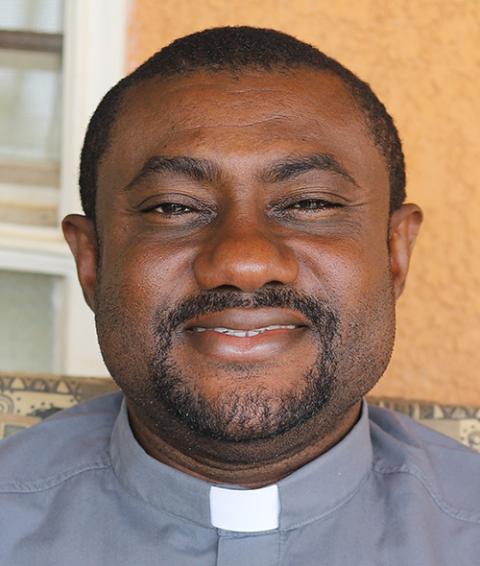
Angela (name changed) was forced to scam people online after she was trafficked to Thailand. She now receives training in catering at a local college in Lusaka, Zambia, after her return. Her training is sponsored by Catholic leaders working to end human trafficking in the country. (GSR photo/Doreen Ajiambo)
Angela came across a Facebook ad in February 2021 for a teaching job in Thailand that offered a good salary. The company was looking for an English teacher who also knew Mandarin.
Angela, who was proficient in both languages, applied for the job. Upon arriving in Thailand, she found out that it wasn't a teaching job: Instead, she was coerced into scamming people online to defraud them or get them involved in an online scam.
She explained to Global Sisters Report that she was trafficked to Thailand from Zambia by a criminal gang "who took her travel documents and demanded that she recruit more people or pay a large ransom to be released."
"If you refuse to work, we will either torture you or electrocute you," Angela recalled her tormenters telling her. (She requested her real name not be revealed.)
They forced her into one of the fastest-growing types of scams in the world: the pig butchering scam, where scammers trick people into investing in cryptocurrency platforms after building trust through digital relationships. Surprisingly, some scammers, like Angela, are victims of human trafficking themselves. They often deceive people with promises of real jobs and then coerce them into scam operations using threats of violence.
According to a report by the United Nations Human Rights Office, hundreds of thousands of those trafficked after being lured by online job ads promising them high-paying jobs end up in Southeast Asia, especially in countries like Thailand, Laos, Myanmar, Cambodia and the Philippines, among others. The report notes that upon arrival, traffickers confiscate travel documents from the victims and hold them prisoners. The victims are tortured, sexually abused, and forced to work in online scams.
Advertisement
Angela and her three colleagues escaped from their workplace near the Thailand-Laos border after enduring a year of mistreatment. They hid in a garbage truck and then turned themselves in to the police once they were outside. The police detained them for two weeks for being in the country illegally before deporting Angela back to Zambia.
"My only wish was to go there and get a job that could change my life and that of my siblings," she said, struggling to hold back tears. "But when I got there, my life changed for the worse because I did things to people that I regret to this day. I stole from innocent people and can never forgive myself for that."
After returning to Zambia, Angela endured severe mental health issues, including post-traumatic stress disorder (PTSD). Her church members introduced her to the religious sisters who operate Talitha Kum Zambia, or TAKUZA, an organization that aims to end human trafficking in Zambia.
TAKUZA consists of 45 religious sisters from various congregations who are dedicated to identifying those affected by human trafficking. The sisters also work to raise awareness and provide support to victims of human trafficking. TAKUZA collaborates with other organizations, such as the police and counseling units in Zambia, where counselors help victims of human trafficking recover from trauma.
"Human trafficking is a global issue, and as TAKUZA, we address all issues related to human trafficking," said Sr. Kayula Lesa, a member of the Religious Sisters of Charity. "As an organization, we continuously seek out individuals who have been trafficked or are at risk and in need of our assistance. We provide guidance and psychological support to the victims, offering them the opportunity to express themselves, heal, rebuild their confidence, and lead better lives."

Sr. Kayula Lesa, a member of the Religious Sisters of Charity, speaks to survivors of human trafficking March 12 in Lusaka, Zambia. Religious sisters have been raising awareness of human trafficking and also assisting victims. (GSR photo/Doreen Ajiambo)
TAKUZA is supported by the Conrad N. Hilton Foundation, which also provides funding for Global Sisters Report.
Lesa observed that Angela had experienced severe violence, sexual exploitation, and psychological abuse during her time as a captive in Thailand. In addition to her PTSD, anxiety and depression, she also felt shame.
"We have counselors working with Angela and other survivors to help them heal from their traumas and manage their mental health," Lesa said. "We are also focused on reintegrating survivors back into their families and empowering them to start small businesses."
Angela is one among thousands of survivors of trafficking getting support from religious sisters in the Southern African country of more than 20.7 million people. Forms of human trafficking include forced labor, sexual exploitation, forced criminal activities, forced marriage, illegal adoption, slavery, removal of organs and transportation of babies.
The landlocked country is vulnerable to modern slavery as it is a source, transit and destination country, particularly for women and children, according to the 2023 edition of the annual Trafficking in Persons Report issued by the U.S. State Department. The report indicates that the majority of cases occur along the nation's borders and involve the trafficking of women and children from poor rural areas to urban or neighboring countries, including Namibia, South Africa, Zimbabwe and Mozambique.

Sr. Patience Shinondo, a member of the Religious Sisters of Charity, works with other stakeholders to fight human trafficking in Zambia. (GSR photo/Doreen Ajiambo)
The report further revealed that these trafficked women and children are subjected to sexual exploitation, domestic servitude, forced begging or labor in various destinations, as smuggling routes between the Horn of Africa and Southern Africa often pass through the country.
Meanwhile, the U.S. Department of State report acknowledges that despite Zambia not fully meeting the minimum standards for the elimination of trafficking, the country is dedicated to combating exploitation and human trafficking. According to the report, authorities initiated 42 trafficking investigations in 2022 and continued eight investigations, compared to 12 investigations in 2021. Additionally, 79 trafficking victims were identified in 2022, as opposed to 42 in 2021.
Lesa, the country director for TAKUZA, said, "Our efforts in tackling exploitation and trafficking have led to a reduction in human trafficking cases in the country over time, and we have been able to restore the future of many victims."
She added that her organization had intensified awareness campaigns nationwide to reach every trafficking victim and train communities on how to recognize human trafficking and its targets, especially young people.
"As sisters, we have been organizing monthly workshops in schools and churches to raise awareness and help youth affected by trafficking" she said, noting that the economic and educational opportunities provided by her organization to victims and young people over the past years would further reduce the risk of trafficking due to poverty.
Sr. Patience Shinondo and Fr. Philip Meraba, both of TAKUZA, are advocating to address the issue of illegal migration by urging the government to tighten borders. According to Shinondo, Zambia is grappling with the problem of human smuggling, with many victims being brought into the country to work in the mining sector. Zambia is Africa's second-largest copper producer after the neighboring Democratic Republic of Congo.
"Once the government discovers these illegal immigrants, they are arrested and end up in prisons with no means of going back to their countries of origin," said Meraba, a member of the Society of Missionaries of Africa. He explained how they visit those arrested in prisons and help them to be deported back to their countries.
Shinondo, a member of the Religious Sisters of Charity, stated that she is working to secure more resources to assist additional victims of trafficking. She plans to provide them with training in skills such as tailoring, catering and mechanics to help them rebuild their lives. For those who are imprisoned due to smuggling, she mentioned that they are being bailed out and provided with air tickets to return to their home countries.
"We have successfully facilitated the return of five illegal immigrants to their homes since launching this project last year," she reported.
Currently, Angela has high hopes that the therapy sessions she is attending at TAKUZA will help her heal completely and move on.
She said, "I have returned to the country but I still don't have a job. My problems persist, but I am hopeful that things will improve. Although it's difficult to forget what I've been through, I feel somewhat happy because of the ongoing support I receive from my therapist and the religious sisters."








